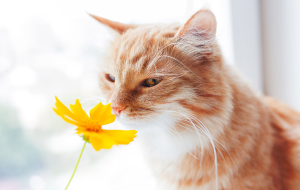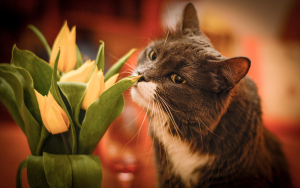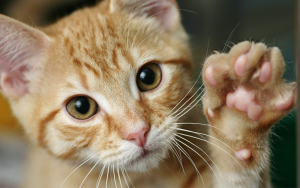Why Do Dogs Eat Cat Poop? Understanding the Reasons and Solutions

Dogs are curious creatures with habits that sometimes baffle even the most experienced pet owners. One of these perplexing behaviors is their tendency to eat cat poop, a phenomenon known as coprophagia. While it may seem gross to us, it’s not uncommon
for dogs to indulge in this habit. Understanding why dogs eat cat poop is essential for managing this behavior and ensuring your pet’s health.
In this article, we will explore the reasons behind this peculiar behavior, the potential health risks involved, and practical steps to prevent your dog from eating cat poop.
Why Do Dogs Eat Cat Poop?
1. Nutritional Deficiencies
One of the primary reasons dogs may eat cat poop is due to nutritional deficiencies. Cat feces often contain undigested proteins and nutrients because of cats’ high-protein diets. Dogs with inadequate nutrition might be drawn to cat poop to supplement
their diet.
Solution: Ensure your dog’s diet is balanced and meets all their nutritional needs. High-quality dog food that contains the right mix of proteins, fats, carbohydrates, vitamins, and minerals can help.
2. Curiosity and Exploratory Behavior
Dogs are naturally curious animals. They use their noses and mouths to explore the world around them. The smell of cat feces, which may carry strong odors due to a cat’s protein-rich diet, can attract dogs.
Solution: Provide your dog with safe and engaging toys to keep their curiosity satisfied and redirect their attention away from undesirable items.
3. Behavioral Issues or Boredom
Boredom or a lack of mental stimulation can lead to undesirable behaviors, including eating cat poop. Dogs left alone for long periods or those without sufficient exercise may develop this habit as a way to entertain themselves.
Solution: Regular exercise and mental stimulation through activities like puzzle toys, training sessions, and socialization can help curb this behavior.
4. Instinctual Behavior
In the wild, dogs and their ancestors consumed feces to clean their dens and prevent the spread of parasites. While this behavior isn’t necessary for domesticated dogs, some retain this instinct.
Solution: Supervise your dog’s interactions with areas where cat poop might be present and train them to avoid it.
5. Attraction to Smell and Taste
Cat feces can be particularly appealing to dogs because of their smell and taste. Cats’ protein-heavy diets often result in waste that has residual food odors, making it tempting for dogs.
Solution: Address this by keeping the litter box out of reach and regularly cleaning it.
Potential Health Risks of Dogs Eating Cat Poop
1. Parasites
Cat feces can contain harmful parasites like Toxoplasma gondii, roundworms, or hookworms. If ingested, these parasites can infect your dog and lead to serious health issues.
2. Bacterial Infections
Feces may carry harmful bacteria such as Salmonella or E. coli. Consuming contaminated feces can cause digestive upset and other health complications in dogs.
3. Toxins and Medications
If a cat has ingested medications or toxic substances, traces of these could be present in their feces and harmful to a dog that consumes it.
4. Obstruction Risks
Some dogs may swallow litter along with cat feces, especially if clumping litter is used. This can cause intestinal blockages, which may require emergency veterinary care.
Action Tip: Regular veterinary check-ups can help detect and address any potential health concerns arising from this behavior.
How to Stop Your Dog from Eating Cat Poop
1. Restrict Access to the Litter Box
-
Place the litter box in a location that is inaccessible to your dog, such as a high shelf or behind a baby gate.
-
Use a covered litter box with a small entry hole that only the cat can access.
2. Clean the Litter Box Frequently
The less opportunity your dog has to access cat poop, the better. Scoop the litter box at least once or twice a day to minimize temptation.
3. Train Your Dog
Training your dog to “leave it” or “no” can be effective in preventing them from eating cat poop. Positive reinforcement training works best:
-
Reward your dog with treats or praise when they obey commands.
-
Redirect their attention to appropriate activities.
4. Provide a Balanced Diet
Ensure your dog’s diet meets their nutritional needs. Speak with your veterinarian to choose the best food for your dog’s age, breed, and activity level.
5. Use Deterrents
Commercially available deterrent sprays or natural solutions like placing a small amount of cayenne pepper near the litter box can discourage your dog from approaching it. Always ensure these are safe for pets.
6. Increase Supervision
Monitor your dog closely, especially in areas where they might encounter cat feces. Use a leash during walks if necessary.
7. Consult Your Veterinarian
If your dog’s behavior persists despite your efforts, consult a veterinarian. They can help rule out medical causes and recommend behavioral strategies or nutritional adjustments.
When to See a Veterinarian
While eating cat poop is often a behavioral issue, it can sometimes indicate an underlying medical condition. Contact your veterinarian if:
-
Your dog shows signs of illness, such as vomiting, diarrhea, lethargy, or loss of appetite.
-
The behavior becomes obsessive or uncontrollable.
-
You suspect your dog has ingested litter or harmful substances.
Conclusion
Dogs eating cat poop may be unpleasant, but it’s a behavior that can be managed with the right approach. By understanding the reasons behind this habit and addressing the root causes, you can help your dog avoid this behavior and maintain their health.
Implement preventive measures, provide proper training, and ensure your dog’s dietary and mental needs are met. With patience and consistency, you can keep your furry friend from indulging in this less-than-desirable habit.







